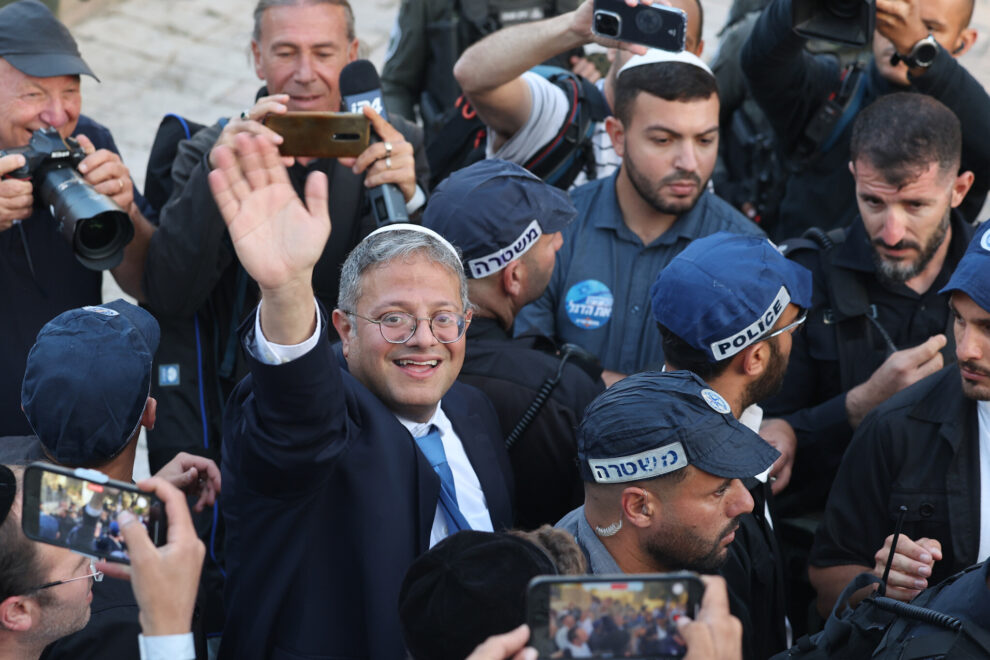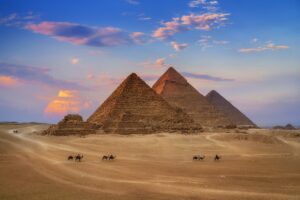The United States expressed deep misgivings with National Security Minister Itamar Ben Gvir’s “provocative” visit to the Temple Mount Sunday, chiding the Israeli hardliner for using “inflammatory rhetoric” and politicizing the holy site.
The statement from State Department spokesperson Matthew Miller also spoke out against Jerusalem for lifting a ban on Israelis entering the area of the former Homesh outpost, paving the way for settlers to return and build a formal settlement there.
Ben Gvir, leader of the extremist Otzma Yehudit party, took a highly visible tour of the Temple Mount on Sunday, boasting that he was flexing Israel’s sovereignty over the flashpoint site holy to both Jews and Muslims.
“We are also concerned by today’s provocative visit to the Temple Mount/Haram al Sharif in Jerusalem and the accompanying inflammatory rhetoric,” the State Department said.
“This holy space should not be used for political purposes, and we call on all parties to respect its sanctity,” it added.
During the tour, Ben Gvir made clear that his visit was intended to send a political message.
“We are in charge here,” Ben Gvir declared. He also praised the police for its administration of Jewish visits to the holy site, which, he said, “prove who is in charge in Jerusalem.”
A previous visit by Ben Gvir shortly after he took office in January drew widespread condemnation from the Arab world and some pushback from the US. On Sunday, many of the same countries again issued fierce rhetoric against the visit; Palestinian Authority presidential spokesman Nabil Abu Rudeineh called it a “blatant attack” on the Al-Aqsa Mosque and Jordan’s Foreign Ministry called it “a provocative step that is condemned, and a dangerous and unacceptable escalation.”
The US statement Sunday did not accuse Ben Gvir of violating the fragile status quo agreement that governs the site, but pointedly affirmed Washington’s commitment to the arrangement and to Jordan’s “special role” regarding Muslim holy sites in Jerusalem.
Israel captured the Temple Mount and Jerusalem’s Old City from Jordan in the 1967 Six Day War. However, it allowed the Jordanian Waqf to continue to maintain religious authority atop the Mount.
The site is considered the holiest in Judaism, as the location of two biblical temples, while the Al-Aqsa Mosque on the Mount is the third-holiest shrine in Islam, turning the area into a major flashpoint in the Israeli-Palestinian conflict.
Under the status quo, an arrangement that has prevailed for decades in cooperation with Jordan, Jews and other non-Muslims are permitted to visit the Temple Mount during certain hours but may not pray there. In recent years, Jewish religious nationalists, including members of the new governing coalition, have increasingly visited the site and demanded equal prayer rights for Jews there, infuriating the Palestinians and Muslims around the world.
Following Ben Gvir’s January tour of the Temple Mount, US Ambassador to Israel Tom Nides shied away from accusing Ben Gvir of violating the status quo, a determination that could set off widespread anger, saying he was there as US envoy to keep calm.
“We weren’t supportive of that visit, given the context,” he added, noting how Ben Gvir had previously campaigned on reversing the status quo on the Temple Mount to allow Jews to pray there. The national security minister has not called for following through on that effort since entering office, though he has denounced what he describes as the “racist” policies governing the site.
A day after the January visit, Prime Minister Benjamin Netanyahu met with Jordanian King Abdullah II in Amman and discussed maintaining calm on the Temple Mount, while Ben Gvir vowed to continue to visit the site regardless.
Troubled by Homesh
The US also said Sunday it was “deeply troubled” by a decision by the chief of the Israeli military’s Central Command to allow Israelis to enter the northern West Bank site where the illegal outpost of Homesh stood before it was razed in 2005.
The move Thursday was celebrated by settlement backers, including Finance Minister Bezalel Smotrich, also a junior minister in the Defense Ministry, who said the order signed by Maj. Gen. Yehuda Fox attaching Homesh to the Samaria Regional Council would allow planning for a new settlement there to move ahead.
In its statement, the State Department noted that Israel had previously determined the outpost to have been built illegally on private Palestinian land.
This order is inconsistent with both former Prime Minister Sharon’s written commitment to the Bush Administration in 2004 and the current Israeli government’s commitments to the Biden Administration,” the statement read.
During a visit to Washington in 2004, Sharon presented US president George W. Bush with his plan to pull all civilian and military assets out of Gaza and parts of the northern West Bank, including razing over 20 settlements or outposts. The evacuation was carried out in 2005, a setback for the settlement movement that some hawks have vowed to undo.
In late February, the current government released a joint statement with the US, Jordan, PA and Egypt in which Jerusalem agreed to a four-month moratorium on discussing new settlement units and a six-month freeze on okaying new outposts.
“Advancing Israeli settlements in the West Bank is an obstacle to the achievement of a two-state solution,” the US statement added.
The statement echoed comments from a US embassy spokesperson in March, after lawmakers okayed a rollback of the 2005 Disengagement Law that banned Israelis from the area where the settlements of Homesh, Ganim, Kadim and Sa-Nur once stood. It remains illegal to enter the latter three.
“We have been clear that advancing settlements is an obstacle to peace and the achievement of a two-state solution. This certainly includes creating new settlements, building or legalizing outposts, or allowing building of any kind on private Palestinian land or deep in the West Bank adjacent to Palestinian communities,” the spokesperson said at the time.
The March repeal bolstered the right-wing and religious government’s efforts to legalize a wildcat outpost currently occupying the site of Homesh and a yeshiva that has been built there, which activists have tried repeatedly to reestablish since 2005. Over the years, authorities have frequently demolished structures at the site.
While the international community considers all settlements in the West Bank illegal, Israel differentiates between settlement homes built and permitted by the Defense Ministry on land owned by the state, and illegal outposts built without necessary permits, often on private Palestinian land.
Homesh itself is built partly private Palestinian land, according to a High Court ruling.
Source : Times of Israel































